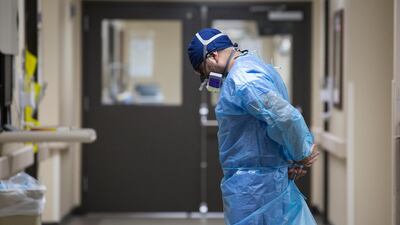Lurking behind the horror of Covid-19, many scientists are increasingly concerned about the rising inefficacy of antibiotics against harmful bacteria.
The drugs have been a mainstay treatment in modern medicine for almost 100 years. The crisis is so severe that some microbiologists say resistance to them is a greater risk to long-term public health than Covid-19. Professor of medical microbiology at Oxford University Tim Walsh describes the current pandemic as a "short, sharp earthquake" and antibiotic resistance the "massive tsunami".
There have been over 2 million deaths from Covid-19 in just under a year. In a parallel crisis that does not involve the virus, one and a half million have died as a result of infections against which antibiotics no longer work.
Growing resistance to the drugs threatens our ability to treat medical issues of all degrees of severity. Even those undergoing routine surgery could be in mortal danger of infection. Health systems across the planet, when the burden of Covid-19 eventually starts to lift, will face a backlog of operations of this kind from hip replacements to gastric bands. The phenomenon also threatens animals and plants.
Resistance happens when a bacteria or fungi are no longer eliminated by an antibiotic. This is fuelled by doctors overprescribing, as well as patients demanding them unnecessarily. It will make the treatment of many conditions far more complex, expensive, time-consuming and toxic, further burdening struggling healthcare systems around the world.
Ineos, a major chemicals company, has just given Oxford University almost $140 million to create an institute to help tackle the problem.
Nations must now follow suit. Allowing this crisis to deteriorate would be an inexcusable failure of the global community. While the response of many countries to the current pandemic has been underwhelming, Covid-19 caught us off guard. This is not the case for antibiotic resistance, which is a threat we have known about for years.

There are some similarities between the two crises. Germs do not respect national borders, so incompetence in just one country impacts the entire globe.
Personal selfishness also worsens the crisis. Much like choosing not to wear a mask risks prolonging the pandemic, failing to complete a course of antibiotics or demanding them when they are unnecessary produces the ideal circumstance for resistant bacteria to develop.
A solution lies partly in scientific innovation, advanced by institutions such as Oxford's. A more comprehensive approach will require governments across the globe to shape policy, as well educate their citizens on the dangers of incorrectly using these crucial drugs.
Alexander Fleming's discovery of penicillin, the first antibiotic, in 1928 was one of the most significant moments in scientific history. It granted medics a chance to fight some of the deadliest diseases at a relatively low cost. This achievement, not even a hundred years after its discovery, risks being squandered without immediate action.
Covid-19 is commanding the attention of the global medical community. This is not an excuse to take our eyes off the ball on other threats. Antibiotic resistance is a foremost danger on which doctors should be focusing.


